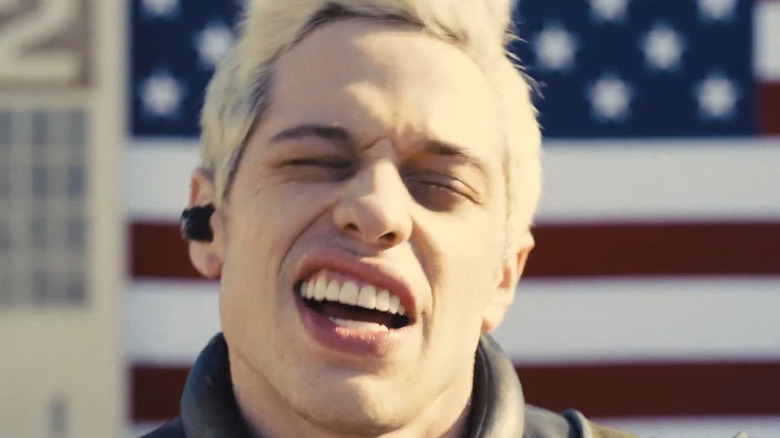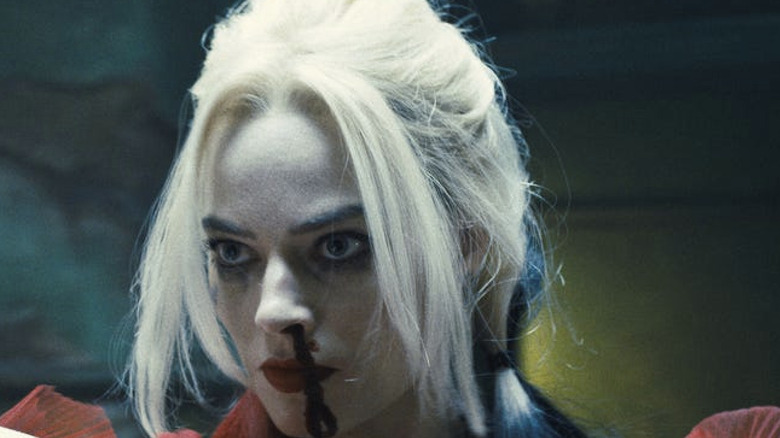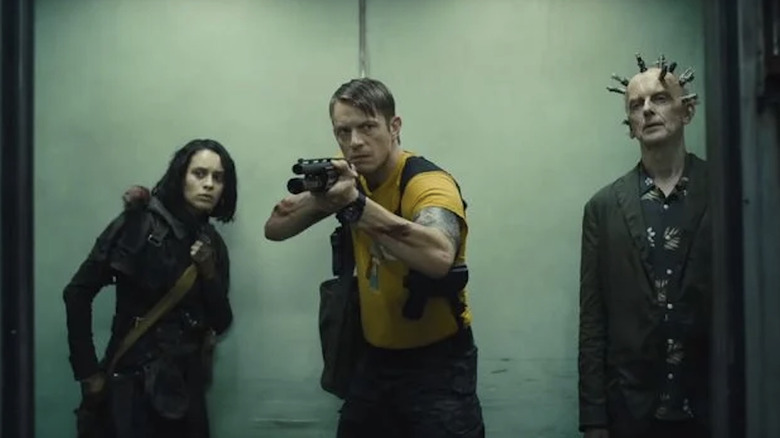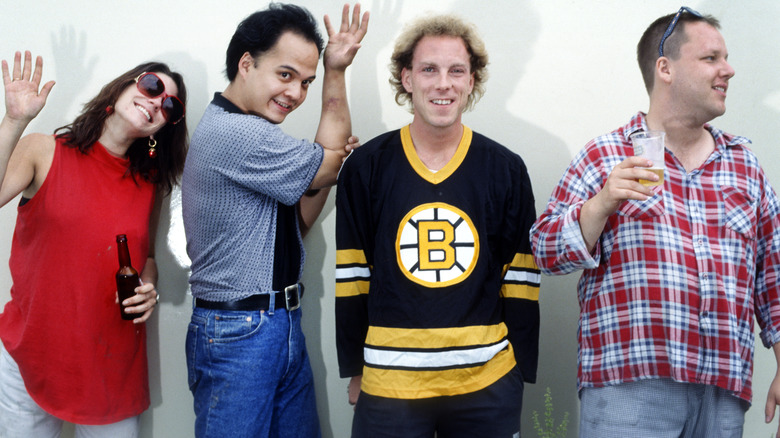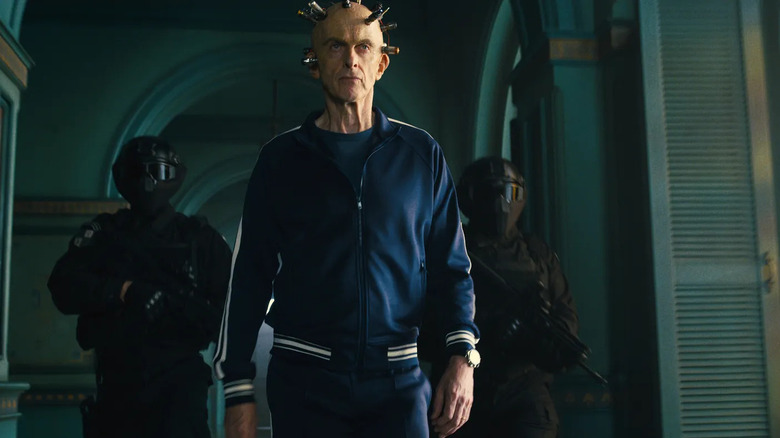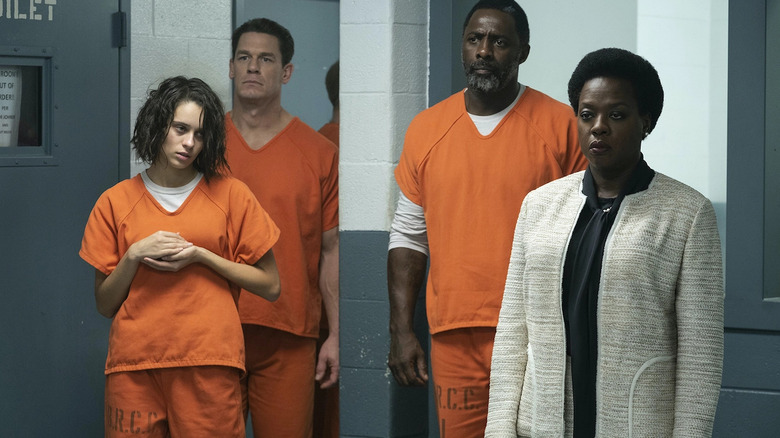Things Only Adults Notice In The Suicide Squad
In the rare instances when an R-rated superhero movie comes along, it's simply naive to think that kids won't see the flick. If you asked the young comic book fans in your life a few months after 2017's "Logan" or 2016's "Deadpool" came out, there's a good chance they'd breathlessly recount every plot point as if it were the newest Disney/Pixar film. Whether it's a "cool" uncle, an unlocked iPad, or a cable channel, somehow they'll track it down.
It makes sense, then, that "The Suicide Squad" — which earns its hard R in the first five minutes of the film — will most likely be your little comic lover's next favorite film. But just because kids will figure out a way to see "The Suicide Squad," that doesn't mean they'll get it — and even if they "get it," the doesn't mean they'll appreciate it. Think back to when you were a kid and would somehow catch a horror movie you weren't supposed to see. The results were a mixture of imagery, confusion, and whole lot of your imagination to fill in the gaps.
Movie stars start sucking on each other's faces, and you need to imagine what happens after the scene fades out; references are made to extreme violence and torture, and your imagination takes you as far as it can go. Ultimately, these things depend on your upbringing, what you've been exposed to thus far, and — hopefully — how willing the adult in your life is to have a conversation with you afterwards about what you saw and put it in a context that helps you develop as a human being.
Is it the end of the world if a 13-year-old sees Harley Quinn in the throes of passion with a handsome dictator? Or witnesses a few dozen CGI soldiers being torn apart, decapitated, and swallowed whole by King Shark? Or hears Peacemaker's theory that the word "Starfish" is code for a certain body part? Well, that depends on the child.
Below is a list of "R-rated" moments in "The Suicide Squad" likely to soar over the heads of kids and teens who might somehow see the film. Adults will understand, enjoy — and hopefully find an appropriate way to explain, if asked. Ultimately, the bottom line is that sharing a movie with another person — even a younger one who's likely to see it anyway — can be a special, bonding experience. As the adult in their lives, it's your job to walk them into the bold, crude world of adult themes — and laugh together when Ratcatcher II threatens to send a rat up the Thinker's butt, even if you have to explain why he replies that he might like that.
Harley's heartbreak
"You are so freakin' hot!" Harley Quinn (Margot Robbie) tells General Presidente Silvio Eleuterio Luna (Juan Diego Botto) after he says they should get married. What follows is a love scene, comic book-movie style. It's appropriate that she says "freakin'," because the entire thing unfolds like a sex scene equivalent of that word, stopping just short of being what adults would really do at a time like that.
Violence is the name of the game when it comes to these movies, but one place even the R-rated films rarely go is graphic sex. Every now and then you get something a bit more adult-themed (like Zack Snyder's "Watchmen" or the original "Deadpool"), but for the most part you're far more likely to get Captain America and Peggy Carter slow dancing than Nite Owl and Silk Spectre II getting sexy to Leonard Cohen.
As a result, the Harley/Presidente scene has all the hallmarks of an R-rated sex scene — people throwing each other against walls, pawing at each other's clothes, destroying nearby items while being too lost in passion to notice — but without any pesky skin-on-skin shots or depiction of sex acts being performed. We see the Presidente's belt being undone, but Harley doesn't remove a stitch of her clothes. Then we see the aftermath — the two of them lying on the floor, basking in the afterglow.
Forget, for a moment, how you explain to a younger person that Harley just made love to a man and then murdered him mere seconds later. Instead, you can focus on the notion that a scene like this gives an inexperienced person an idea of sex, without any serious attempt at depicting it. Even if we're talking about a teen here (and hopefully we are), you might have some explaining to do when they ask how an undone belt led to lying on the floor, panting. The birds and the bees is real, folks — you know what happened, they don't, and somebody needs to fill in those blanks.
Jotunheim's horrors
Although they're never seen, we are informed that Nazis built Jotunheim after World War II, when they came to Corto Maltese seeking asylum and hoping to continue their experiments. Couple this with the eventual reveal of Jotunheim's inner workings, where the elevator button marked "Dirty Little Secrets" houses faceless prisoners held in obscene conditions, shuffling their feet in cramped cells, and you get a fictional horror reflecting a real one.
"If God existed," the Thinker asks. "Wouldn't this be proof that he wasn't good at all?"
For an adult, such imagery coupled with the words "Nazi" brings to mind the most repulsive horrors mankind has ever witnessed — the Holocaust, Auschwitz, Treblinka, Dachau — people like Hitler, Himmler, Mengele and Goebbels, and painful, often deadly experiments on thousands of prisoners without their permission.
Of course, none of this involved an enormous starfish from outer space. But as an adult, there's a reason why words like "Nazi" and "experiment" carry connotations with such power that a blockbuster filmmaker would invoke them when trying to elicit a sense of repulsion from his audience. So, while the superhero subject matter may be sometimes silly, that doesn't make it any less of a good opportunity to engage the young person in your life about the very real horrors that once unfolded on planet Earth — and how they led to the deaths of 11 million souls.
The old saying goes that those who forget their history are condemned to repeat it. So if a "Suicide Squad" movie opens the door for further conversation, mankind would be thankful if you walk through that door and use it to school the next generation. Here's a good place to start.
Music man
When an adult hears the very first words spoken in this movie — "Hello, I'm Johnny Cash" — perhaps they'll realize they're hearing "Folsom Prison Blues," a song the legendary Man in Black performed to a crowd of inmates at Folsom State Prison in 1968. Against the wishes of many, this performance — and the groundbreaking live album that came with it — gave inmates hope and made them feel like human beings, something very important to Cash, who was a hero to the working class, downtrodden, and incarcerated until the day he died. Appropriately, the song plays over footage of Savant (Michael Rooker) sitting in prison, occupying himself with a bouncy ball.
When an adult hears "People Who Died," perhaps they'll realize that this is a song by poet/punk Jim Carroll, and that all those people in the song really did die in those ways. For greater detail about many of those unfortunate acquaintances of Carroll — born to a working-class Irish family in New York's Lower East Side — perhaps the adult may have read Carroll's stellar autobiographical book "The Basketball Diaries," or at least seen the at-times-stellar 1995 Leonardo DiCaprio film of the same name that starred Leo as Carroll.
From Louis Prima to Pixies, the "Suicide Squad" soundtrack is as catchy as it is a gateway to multiple generations, and multiple subtexts these musicians bring to mind. You'd have a hard time finding someone to debate that James Gunn is anything but one of the modern masters at using pop music to give added dimension to a scene, and you likely know that Gunn selects most of his soundtracks while he writes his films, creating scenes around the feelings and associations that a song carries with it.
To a younger person, maybe the song just sounds cool. Maybe — gasp! — they've never heard of Johnny Cash or Black Francis. If so, show them Louis Prima on YouTube — then make pasta together and watch "Big Night." Talk to them about the pitfalls of Carroll's teenage heroin addiction, and the horrible drug-related ends that brought down those people who died. Tell them about how the Pixies met in college, crafting a sound together that would pave the way for Nirvana's world domination.
If the young person in your life loves "The Suicide Squad," they likely also love the music playing while Harley Quinn eviscerates an army of soldiers, flower petals flying out alongside their spraying blood. This is your chance to talk about music old and new — and the more they know about these musicians, the more they'll appreciate the film next time they watch it.
The Thinker's kink
A couple decades back, an urban legend spread from coast to coast about a certain movie star (who will not be named here — you have search engines) who supposedly had a thing for gerbils. True, false or absurd, it didn't really matter — it nonetheless made many folks aware for the first time of a particular kink that some people are apparently into.
Flash-forward to today and you have an antagonistic dynamic in "The Suicide Squad" between Ratcatcher II and the Thinker. In one contentious moment, she says "Do you want a dozen angry rodents crawling up your ass?" to which he responds, "My answer may not be what you expect."
The exchange seems more likely to get a laugh from an adult than a teen, possibly because that adult remembers the pre-internet days when the aforementioned urban legend was spread from locker room to locker room. It also perhaps reflects a generational divide — with an older person more likely to laugh at another's perceived "kink," while it's hard to argue that younger generations are far more accepting, particularly as it pertains to what goes on between consenting adults behind a bedroom door.
So, teens, tolerate your mom and dad if they laugh at that joke — there's a whole history behind it. Adults, don't be upset if your teen says you shouldn't laugh at such things — tolerance and acceptance are almost never bad instincts to possess, even when we're simply overanalyzing a throwaway line about the sex life of a fictional evil genius with wires and metal sticking out of his noggin.
Waller's dilemma
To a younger person, Viola Davis' Amanda Waller is the quasi-bad guy who deploys Task Force X on their mission, and blows up their heads if they try to escape. But if you're an adult who knows anything about the source material, you're aware that Waller has been the driving force of this modern Suicide Squad since the late '80s, and is far and away its most morally complex character.
In 1987's "Secret Origins" #14, we learned that Waller grew up in Chicago, had five kids — and then watched her son killed, daughter attacked, and husband slaughtered while trying to avenge them. When the police refused to help, she had the wherewithal and determination to go back to school, use her education to land a job with the federal government, and then embark on a mission to make sure "metahumans" would never hurt civilians again. Kinda gives you pause when you consider that Waller being knocked unconscious by her mutineering staff is played as a triumphant moment worth cheering.
Want to engage the young person in your life in a conversation about the shortcomings of law enforcement? The desire to take the law into your own hands — and why that can make the problem worse? The slippery slope of vengeance? The moral implications of treating prisoners as something less than human beings with rights? Amanda Waller is your gateway.
While it's easy to watch a superhero film and say "Batman is a vigilante. Isn't that cool?" it's a lot more important (and hopefully, rewarding) to delve into the moral complexities of such characters. Sooner or later, every kid needs to learn that most people aren't good or bad, but instead dwell in the grey area between. Perhaps no superhero series depicts characters in that grey better than the "Suicide Squad" movies, where villains are heroes, heroic figures hide their darkest secrets, and the monster at the end of the movie is a sullen interstellar captive subjected to decades of rendition. Who knows? Such a discussion might not just be good parenting, but it might also give them a deeper appreciation for the movie.
